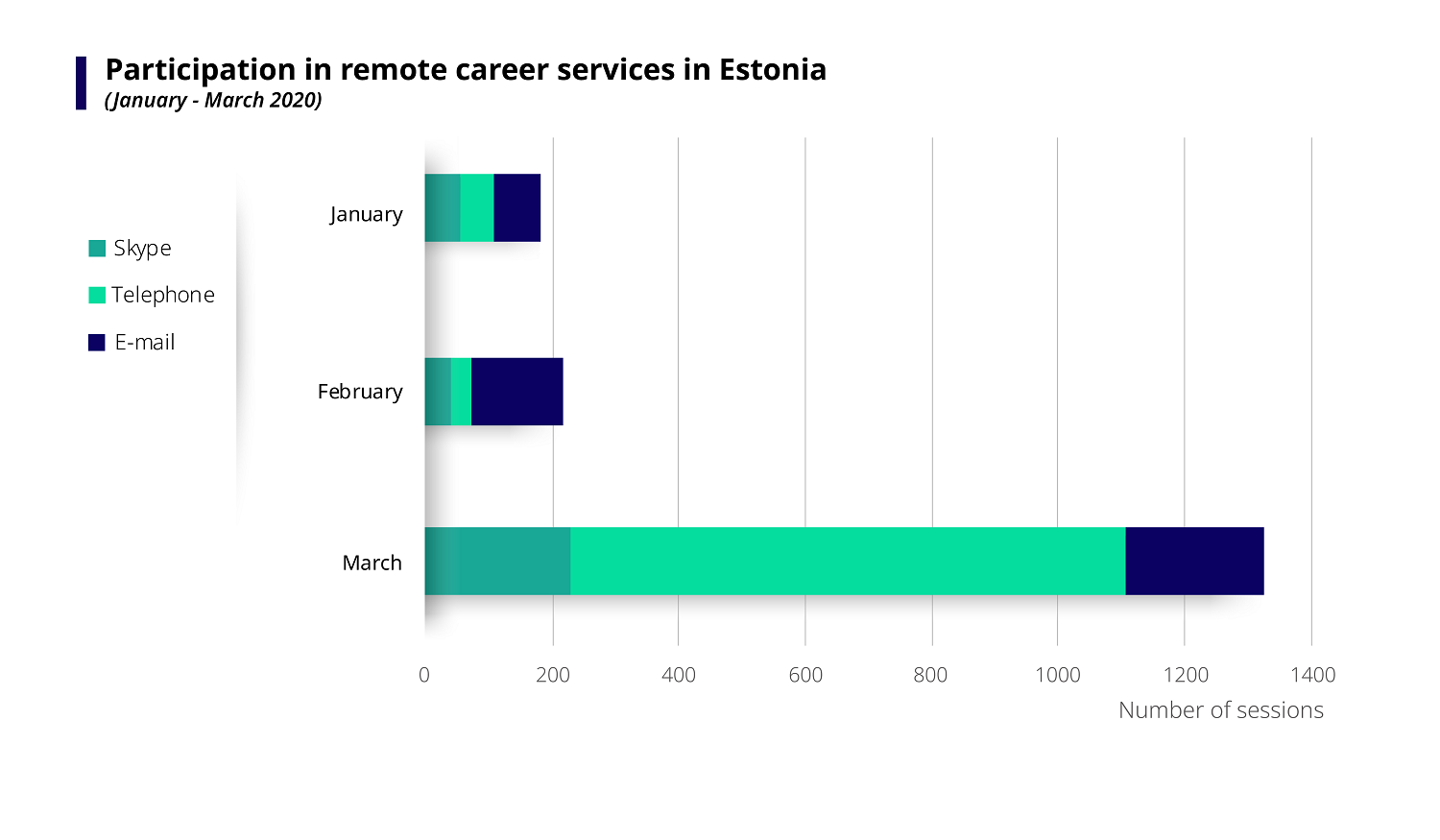By Kerstin Holland
Head of International Relations, Estonian Unemployment Insurance Fund
and Anthony Mann
Senior Analyst, OECD Directorate for Education and Skills
With schools closed across the world in the face of the coronavirus (COVID-19) pandemic, education systems have understandably rushed to enable online teaching and learning. As schools adjust to a new culture of distance learning, it is important to reflect on what else young people are missing out on now that school gates have closed. One important area relates to career guidance and Estonia, a country renowned for its use of digital technologies to deliver public services, is showing how countries can help young people in confinement access the help they need.
Given the likelihood of the COVID-19 crisis being followed by recession, the needs of school and college leavers are especially acute. As recruitment stalls, any long-lasting economic downturn will likely drive up youth unemployment and encourage young people to stay in education longer. For younger job seekers, risks are high of early labour market exclusion and becoming trapped in low-skilled employment misaligned with their qualifications and interests. These difficult circumstances mean greater support is needed to help school leavers prepare to compete for available jobs or to continue in education. Many young people, particularly with weaker academic profiles, who had expected to go into work this year will now be looking to stay on in education and must decide what and where to study. For younger students facing important decisions about their next stage of secondary schooling, good decisions require an understanding of how a turbulent labour market is changing demand for the knowledge and skills they are developing. Indeed, all confined students are making daily decisions about just how hard they will study while away from the gaze of their classroom teacher.
Why is career guidance important?
Career guidance is a resource that addresses all these challenges. For school leavers hoping to secure a foothold in an unstable labour market or deciding on a programme of further academic or vocational education, the purpose of guidance is to enable better decisions than would otherwise be possible. Studies show that career guidance activities allow young people to access information or experiences not available at home or elsewhere in school – and are commonly associated with better economic outcomes. For students continuing in education, effective guidance is linked with a reduced risk of later dropout. For all learners, OECD analysis shows that teenagers are much more likely to agree that the education they are pursuing will be useful in their jobs as adults if they have spoken with a career counsellor or taken part in guidance activities with employers, such as job fairs or work placements. Good career guidance is motivating and helps young people to connect their current learning with their imagined futures.
Two interventions have proven especially helpful to young people. Students encountering large numbers of people in work through job fairs or career talks organised by their schools are likely to gain new and useful information they feel they can trust. These interactions are associated with higher earnings in later life, especially when schools ensure that students reflect on what they have learnt. This is particularly the case for more disadvantaged students.
A second key intervention relates to how schools can help young people gain access to real employment while they are still in, or immediately after completing, full-time education. Studies show consistently that adults do better in work if they were first employed on a part-time basis whilst still in school. While excessive hours can be detrimental to qualification achievement, education systems that help students find appropriate levels of work are giving them valuable experience and connections for later life.
Good career guidance is motivating and helps young people to connect their current learning with their imagined futures.
Online career guidance in Estonia
The Estonian Unemployment Insurance Fund, a public employment service (PES), provides career guidance services in Estonia. Services are available free of charge to everyone, regardless of age or economic activity. COVID-19 has made face-to-face contacts impossible, but different online tools are being used to continue providing support at a time when it is needed most.
Estonia has been providing career services on line (via telephone, e-mail and Skype) for several years as an alternative to in-person meetings. It is a way to overcome obstacles that prevent people from reaching PES offices, and to provide guidance to those who wish to remain anonymous. While physical meetings are mostly preferred by both clients and counsellors, preparing the PES’s counsellors to take their work on line has now proved its necessity. While the coronavirus pandemic has closed all PES offices until the end of the crisis (which is currently undefinable), Estonians are still able to access high-quality counselling services. As the Estonian economy shows clear signs of downturn, more and more people are losing jobs and are in need of professional support in guiding them to their next decisions about study or work. For young people, schools may be closed but studying continues and many young people will soon complete secondary education programmes and need expert support to make decisions about their future. Every Estonian upper secondary school has a liaison consultant at the PES. Through these professionals, schools and students are briefed on how national guidance has adapted to the crisis and what support is available on line for pupils and their parents.
To get individualised support on career choice, both young people still in school and adults already in the labour market can schedule a meeting on the PES’s self-service portal for a Skype chat. Counselling via phone, e-mail or Microsoft Teams (used for both individual and group consultations) are also options. The COVID-19 crisis has seen a surge of users connecting with counsellors who work from home. Prior to the crisis, approximately 3 500 people in total used the career counselling service every week – with fewer than 200 users participating remotely. As Estonia went into confinement in mid-March, the total number of counselling sessions dropped to around 600 per week. Since then, demand for remote counselling has skyrocketed. Between January and March 2020, the number of remote sessions rose from 182 to 1 327, and this excludes use of Microsoft Teams. It is interesting to note that clients prefer having a conversation over the telephone, rather than having a video conversation.

Job and career fairs in times of crisis
With the coronavirus crisis spreading, Estonian job fairs have been cancelled for the first half of 2020. While employers and officials at the PES, who had been preparing regional job fairs for months, were disappointed, it became clear that an alternative solution was needed quickly. Despite the crisis driving many employers to reduce workloads for employees or even make employees redundant, many sectors (such as agriculture and e-trade) are in increasingly desperate need for workers.
Here again, the experience Estonia had gained for over recent years with another set of tools to host job fairs on line proved valuable. The PES had previously organised a series of EURES (EURopean Employment Services) international online job fairs. This valuable experience is being drawn upon to create more online job fairs through a platform called onlineexpo.com. The platform allows users to exchange information about vacancies and enables webinars and video seminars on different topics related to job choice and career path, including career talks aimed at young people.
In this time of crisis, to answer the urgent need of some employers to fill vacancies quickly, a special online job fair was set up in just a couple of days. Both employers and job seekers were made aware of the initiative through public television and radio, advertisements on social media and private web pages, and mass mailing of all the partner-employers of the PES. Forty-eight hours after the platform was opened, it had received 38 000 visits.
Remote career guidance is here to stay in Estonia – with or without crisis. They enable flexible participation without sacrificing quality.
Using an online platform as a professional meeting place has proved particularly effective with young people. In 2019, the PES organised a summer-work online job fair for people aged 13-26. Within two days of being ‘open’, the virtual fair had around 92 000 visits and job ads from 121 different employers. The online platform was successful because it:
- Enabled participants to connect in real-time with employers via a chat function.
- Grouped job ads according to age groups and field of activity, making it easier for young people to find suitable vacancies.
- Allowed users to participate in interactive webinars and follow video seminars.
Remote career guidance, including online job fairs, is here to stay in Estonia – with or without crisis. They enable flexible participation without sacrificing quality, when managed carefully.
The 2018 OECD Programme for International Student Assessment (PISA) asked students in 32 countries about the career guidance activities that they had experienced by the age of 15. On average, fewer than half had spoken with a career guidance counsellor in school, taken part in a job fair or job shadowing, or undertaken an internship. As the labour market becomes more uncertain and decision-making becomes more difficult, it is more important than ever that young people have an informed understanding of the labour market and access to expert advice from counsellors and people in work.
Read more:
- Coronavirus and the future of learning: Towards a new EdTech industry?
- Coronavirus and the future of learning: What AI could have made possible
- During the coronavirus crisis, children need books more than ever!
- Education disrupted – education rebuilt: Some insights from PISA on the availability and use of digital tools for learning
- How can teachers and school systems respond to the COVID-19 pandemic? Some lessons from TALIS
- The OECD coronavirus (COVID-19) policy hub


